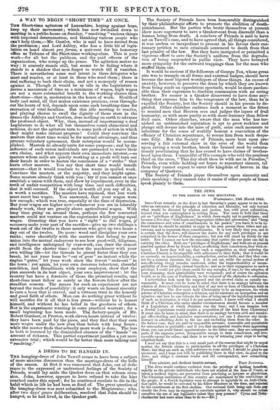A WAY TO BEGIN "SHORT TIME" AT ONCE.
Tan Short-time agitators of Lancashire, hoping against hope, keep up their movement ; which has now dwmdled down to meeting in a public-house on Sunday, "resolving "various things with impotent determination, and thanking various people who can't help them,—Mr. Oastler, who is said to have retired from
the profession ; and Lord Ashley, who has a little bit of legis- lation on hand almost pro forma, a quit-rent for his honorary office as Tribune of the Short-time working,-class. This is poor work—for all but the publican, and the paid officers of the organization, who Scrape up the pence. The agitation makes no way : it scarcely stands still, but seems to be fading where it stands to a shadow that men forget to watch till it vanishes. There is nevertheless some real intent in these delegates who meet and resolve, or at least in those who send them ; there is real suffering to back their claim, and not a monopoly of reason against it. Though it would be as idle in the Legislature to decree a maximum of time as a minimum of wages, high wages are not a more substantial benefit to the working classes than short-time—that is, moderation in the hours of work. Health of body and mind, all that makes existence precious, even through- out the hours of toil, depends upon some such breathing-time for recreation of vital faculties. But this idle meeting to resolve, and playing chorus to swell the dignity of those stars in the drama the Ashleys and Oastlers, does nothing on earth to advance the professed object. Why, then, instead of importuning a deaf Legislature to do what all but themselves count chimerical and noxious, do not the agitators turn to some path of action in which they might make instant progress Could they convince the masters that short time would be for mutual advantage, and thus procure voluntary agreement, their enterprise would be accom- plished. Masters do already unite for some purposes ; and by the influence of such union individuals are persuaded to waive their own choice, and what appears their own immediate interest,—as masters whose mills are quietly working at a profit will turn out their hands in order to hasten the conclusion of a " strike " that hurts other masters. You say that short time would benefit masters—that it would conduce to less waste in spoiled work. Convince the masters, or the majority, and they might agree. Some masters already think with you : try if you cannot at once establish a union with them, and show by experiment, even in the teeth of unfair competition with long time and such difficulties, that it will succeed. If the object is worth all you say of it, it is worth a sacrifice. The masters have rejoined, that less work must merit less wages. You answered, that your wages were low enough; which was true, especially at the time of depression. But your wages are higher now—whenever you are in tolerably steady work, they are greatly above agricultural wages. With long time going on around them, perhaps the few converted masters could not venture on the experiment while paying equal wages. Granting that you have a " right " to full wages, if necessary make your part of the sacrifice—give up two shillings a Week out of the twelve to those masters who give up two hours a day out of the twelve. Do more: weed and discipline your own tanks ; enter cheerfully with the masters that belong to your union into the mutual endeavour to see how good-will, diligence, and intelligence unfatigued by over-work, can draw the utmost profit from the shorter time : endow the machinery with your own willing life—let the threads be pieced faster than they can break, let not your loom be "out of gear" an instant while the engine " gates," let your work show the fewest " ends-out " in the town : yet again, let your own decorous behaviour, cheerful condition, and friendliness with your employer, show that the plan succeeds in its best object, your own improvement : let the country but have a foretaste of those the promised results, and short-time must follow as surely as the flowers follow after the steedfast seasons. The means for such an experiment are not beyond the reach of possibility : it only wants an honest sincerity to earn a boon that is craved, and a virtuous trust in the honesty and good faith of others. Man can do nothing great without he will sacrifice for it all that is less great—without he is honest himself, and without he has belief in the goodness of others. Nor is the experiment wanting in some practical warrant ; for a amall beginmng has bean made. The factory-people of Mr. Robert Gardner, at Preston, work eleven hours instead of twelve: they have been paid by the piece, and they find that they earn more wages under the new plan than before with long hours ; while the master finds that actually more work is done. The loss to both is lessened by the diminished absence of the " hands " on account of sickness. This partial experiment justifies a yet more -extensive trial ; which would be far better than mere talking and a resolving."


























 Previous page
Previous page